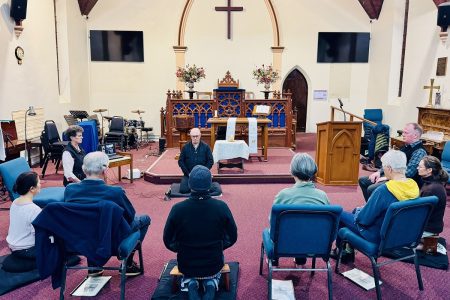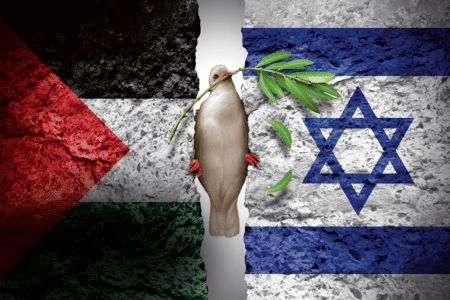As parts of Victoria burned explosively and uncontrollably over the New Year period, Rev Jennie Gordon, UCA minister in Gippsland, was one of the volunteer chaplains deployed to assist those in need. These are the gripping, sometimes heartbreaking stories she witnessed and heard.
This is holy ground, take off your shoes. This is holy time, the sharing of stories.
Death and resurrection are intrinsic to our faith. Moving through the drama and darkness of Good Friday. Sitting in the confusion and grief of the middling time. Then, when all seems lost, hearts broken and arms full of holy herbs, we awake to the surprising life of Easter dawn. Images in the stories that follow resonate deeply within our gospel narrative. You will find them. They will find you. You can be lost in the darkness for a time, but the light will locate you and whisper your name. Listen, keep your eyes and hearts open …
Bairnsdale
People take their places in the pews as usual, but the greetings run deeper and the stilling of the voices takes longer. In the waiting, facing them from the sanctuary of my place as a visiting leader, I sense the gathered body re-membering, reconnecting parts of the whole, re-forming into the collective congregation of faithful and fearful together… blessed are you.
It’s Sunday, 5 January, 2020, Bairnsdale Uniting Church. The East Gippsland fires have been burning since late November with a disastrous escalation on 29 December and in the days that followed.
We’re only 15 minutes’ drive from one of the most impacted towns. The little hamlet of Sarsfield has been devastated, with many houses and properties lost. Some of the church members’ homes are among the survivors, but they’ve lost fences and sheds. I’ve stumbled from sleep in our campervan parked in the driveway of the church house and inside into the shower.
The manse is vacant after the recent retirement of the minister and is a welcome place of rest and respite for Victorian Council of Churches Emergencies Ministry chaplains deployed for shifts in the relief centre at the football club. Chaplains have come to Bairnsdale from near and far and represent many faiths and denominations and I’m one of them. I’ve had more pastoral conversations in the midst of the mayhem this week than for the whole of last year. Midwives of sacred stories birthed from the blackness.
Worship time begins, continues and ends; we pray, sing, talk, listen, laugh and let the tears fall. We rehearse our faith so we can act and speak when it’s called on. There’s a space for the Spirit to bless us and the bread and wine; nourishment for struggling souls becoming what we are, the body of Christ. There are greetings and thanks at the door; “that was what we needed”. Tea pots are hot and talk flows freely again.
I stay on in Bairnsdale for the remainder of the week, sleeping in the driveway between shifts with strangers whose faces became familiar. We listen with open ears and ready hearts, dodge the media, dine in style on delicious curries from the Sikh food truck at the relief centre, watch the deluge of donations continue to flood in and manage each moment as best we can.
Snapshots stick in my memory; the teenager gently resting his hands on the shoulders of his sobbing mother as she sat trying to come to terms with losing it all, the delight on the face of the woman who discovered her estranged daughter was safe, the wildlife carer with baby wallabies in a port-a-cot on the back oval, the young doctor who volunteered her time and had local smarts and a caring heart, the dogs that slipped their leads and headed off into the night, the people who perched at the closed-up bar and watched cricket for days on end when the disaster updates became too much, and the older couple who slept happily in their fishing boat out the back, emerging for meals and a shower. There are plenty more, but they’re not for sharing.
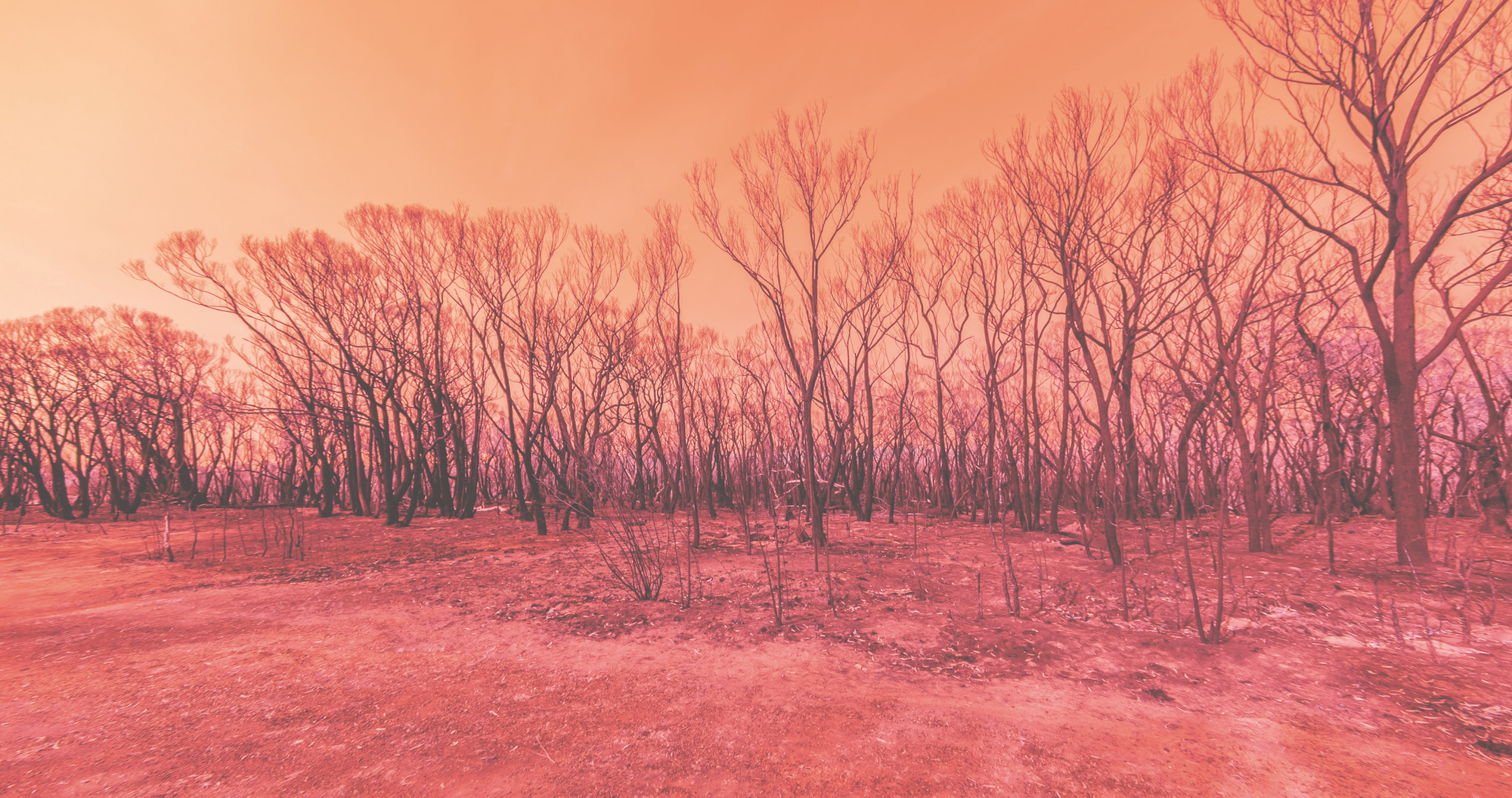
186,000 square kilometres were burnt in the Summer bushfires.
Three days later, at the request of the community, the Bairnsdale UCA hosts a “Sarsfield Community Debrief” with the Twin Rivers Lions Club. Marilyn Cassidy, chair of the Church Council, makes sure there are trauma counsellors present, with rooms to sit quietly and talk. Doors open. The mood is heavy and uncertain as folk and families gather.
Local and state politicians and Blaze Aid volunteers address about 200 people. The church is dimly lit with soft music playing. A cross formed by two large branches lies in front of the communion table and a few people wander in and sit.
A finger-food dinner is served and the mood lifts as people share stories and experiences.
The Sarsfield Hall Committee will take over responsibility from here and they’re grateful for this generous and hospitable space of care and connection. Marilyn sees this as Epiphany, glimpsing the revelation of Christ in the humanity of people, in the simple, generous spirit of reaching out to each other.
An essay by a Melbourne writer talked about struggling to make sense of the unfettered flow of urban life while this disaster was unfolding. Apart from the occasional need for a mask to breathe through, café conversation and life in general went on seemingly untouched by the blazing fires out in the east of the state and across our country. The writer found solace in a classroom of like-minded people learning how to create ritual and hold meaning in these tragic times.
This is what we do as church, in times of great triumph or trouble, and in all the other ordinary times. Gather, bless and confess then feast on forgiveness, breathe as one in song, bask in silence, summon the Spirit, take heed of the Jesus stories and tremble or sleep, pass the peace and pray for hope and healing. Then tell our tales over a cup of tea, and with a fistful of faith, go and brave the beloved world together … blessed are you.
Mallacoota
“I wish it need not have happened in my time,” said Frodo.
“So do I,” said Gandalf, “and so do all who live to see such times. But that is not for them to decide. All we have to decide is what to do with the time that is given us.”
The Lord of the Rings, J.R.R.Tolkien
She’s the only priest in placement in town, in the only church in the region. She wishes it need not have happened in her time, but it did.
Rev Jude Benton is the Anglican Priest-in-Charge in our co-operating Anglican-Uniting Parish of Croajingolong. She’s another of our excellent imports from New Zealand and has been in this placement for 18 months.
The manse is in Mallacoota and she shares it with her husband, Andy, who works for the Victorian Fisheries Association, and their cat, Nelson, who works for no one. On the Sunday after Christmas, Jude stands up in church and tells them all the exciting things that are ahead in the coming week with Scripture Union’s THEOS and Family Mission teams.
The first “bing” of the Vic Emergency App goes off on Sunday afternoon, notifying them of a fire at Wingan Inlet in the Croajingolong National Park. It’s only a matter of time before it impacts their town. Jude comes up with a new plan for Monday; gather to pray at 10am, people can go to the meeting at 11am, while she prepares the church as an evacuation centre and they’ll take it from there.
At the meeting they’re confronted with the horrifying reality; this is likely to be like 2009’s Black Saturday. It will be raining embers and they are urged to leave town and go north. Jude’s parents, holidaying with them from New Zealand, make it out towards Melbourne before the road closes. As they leave the manse, Jude can’t think what else to pack in the car. What’s valuable? What would I miss? She sends them off with love and prayers.
They drive her car to Cann River, unaware they are so close to where the fires are burning. Not wanting to drive too far in this unfamiliar landscape, they catch a bus to Bairnsdale and a train to Melbourne. Safe. It is another three weeks before Jude can retrieve the car.
Jude knew her job was to stay, and Andy agreed. “Maybe if we had young children, we might have made a different decision, that would have been difficult, but it’s just us and Nelson,” she says.
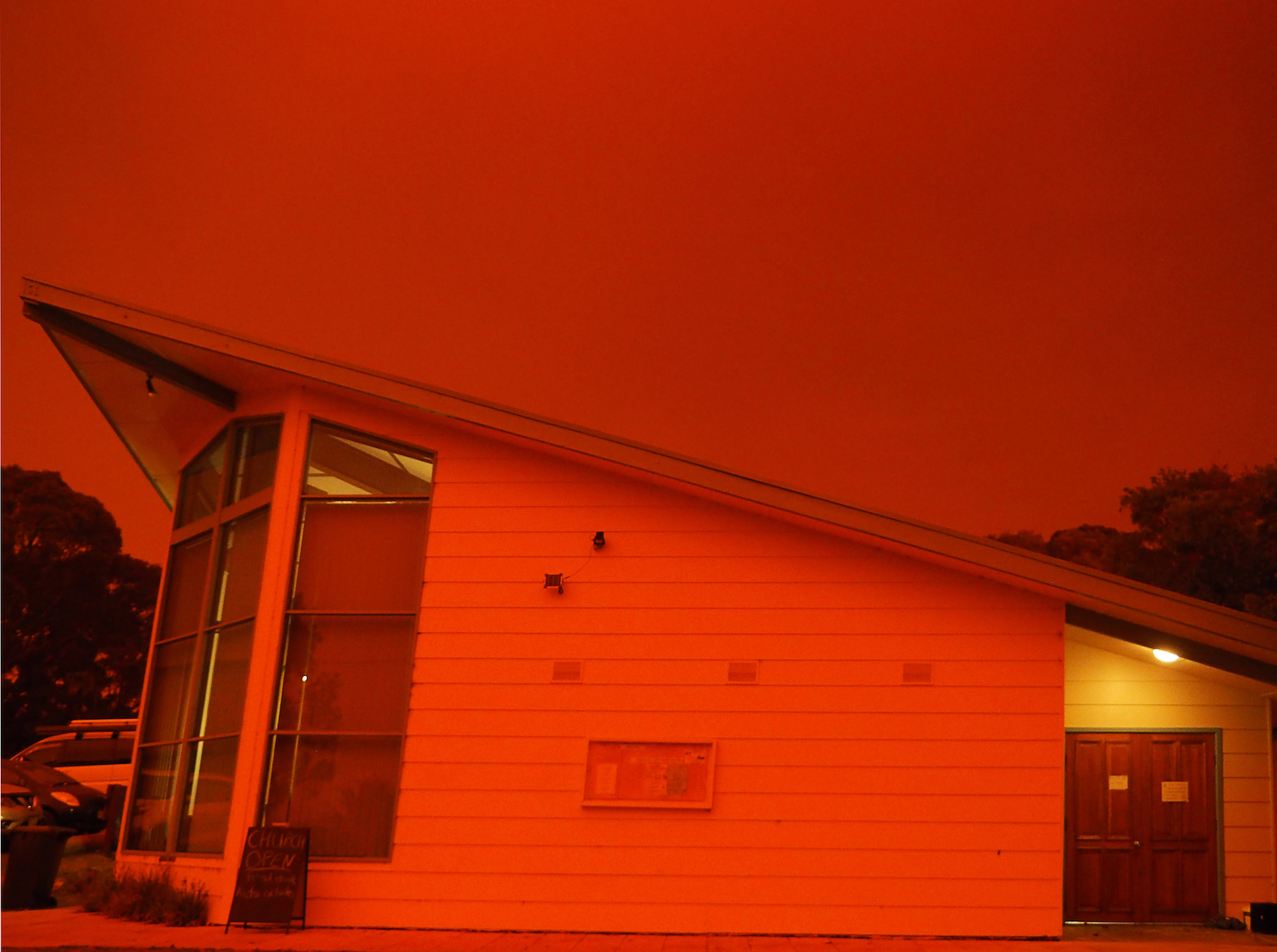
Mallacoota Uniting Church, December 29. Photo: Jude Benton
Jude stocks the church with supplies; food, drinks, movies and bedding from its Op Shop for the 60 people who are hoping to shelter there. Someone with a fluoro vest comes in and tells them to evacuate and go down to the beach. As they’re preparing to obey, the police turn up and tell them it’s OK, they don’t have to leave.
The teams from Scripture Union stay with the people. They will be evacuated to the beach in the early morning, then stay on for the next few days running their programs from the church. Right now, though, there’s mad panic and Jude and Andy decide it’s time to go.
It’s all surreal and frightening. A police friend turns up and tells them to take their boat out where it’s safe and sit tight. He tells Jude there will be plenty for her to do when they return.
Gathering backpacks, blankets and a cage with a cat, Jude and Andy walk through the caravan park to the jetty, where the boat is moored. People eating crackers and cheese on comfy chairs outside their vans eye them with disdain, as if they are freaks, fearfully fleeing the wrath that might not even come. As they push out on to the water at 7pm it’s already getting gloomy. The middle of the lake is dark and brooding and they’re glad to find others.
Abalone boats and tour boats huddle together. There are 35 boats in all, pulled up on Goodwin Sands. They throw water across the deck and then curl up below. Nelson roams the cabin, settles and sleeps well.
Breakfast is fruitcake. In the chaos Jude has stocked the church with an abundance of good food, but they’ve just got fruitcake, and cat food. As they wash the decks, they notice the water is full of burnt leaves. The only embers that reach them are already dead.
Through the morning, the sky turns red then to black, dark as night. They can’t see the flames from where they are, but they can hear the unearthly roar and feel the fire breathing. Once it jumps the inlet it will show its face; the dragon, the monster eating up the landscape as it steals around the coast.
In order to go forward, we have to go back a little here and start another story.
Swifts Creek UCA is the base for the Frontier Services High Country Patrol. Bush Chaplain Rev Rowena Harris says she’s OK now, most of the time, and has found ways of coping, supported by a counsellor from the Bethel Centre.
Rowena’s aware that a trigger – a siren or the smell of smoke – might send her spiralling into that fearful state, back to the beach at Mallacoota. Having evacuated calmly but quickly from Swifts Creek when the “leave now” message came through, and staying with a friend in Lakes Entrance, Rowena drove to Mallacoota singing Christmas carols. A welcome relief. This was a planned holiday staying with friends and their children on the outskirts of town.
Rowena is now in Mallacoota and it’s the morning of 30 December. They’ve watched the fires from Cann River barrelling closer. A phone alert says the town is expected to be impacted by flames from midnight and this is the last chance to leave. They don’t, but some do.
Another message brings the impact time forward to 7pm; there’s a growing sense of alarm. They pack the trailer and cars. Mid-afternoon, the directive comes to get out now, to the beach or town hall. They choose the beach and a convoy of cars carrying children, pets and anxious adults joins the hundreds of others in the concrete carpark at the foreshore. They wait, have dinner from a café and wait.
There’s nothing going on and people sit quietly or sleep in cars. They wake to a dawn that doesn’t happen, continued blackness instead of creeping, seeping light. The “any minute” message comes through the phones as sirens begin and cars empty fast. People take blankets for shelter and head to the beach. The first of many homes explodes, cracking the air that’s humming like a thousand bees in the approaching firestorm.
The water is dark and oily. If those burning embers come, emissaries from the evil mouth of devouring flame, they’ll wade into the water, holding the little ones high under the cover of blankets and prayer.
What do you pray at a time like this? The “God don’t let me die” prayer seems a bit ridiculous near so much water, but it begins silently then erupts aloud and with it the shame that this might sound like the distress of a doubter from the mouth of a minister.
What do you pray at a time like this? There’s a deeper knowing that the words don’t matter, that the Spirit hears our fears and prays for us, within us, around us and over us. By this time too, so do thousands of people, thanks to social media.
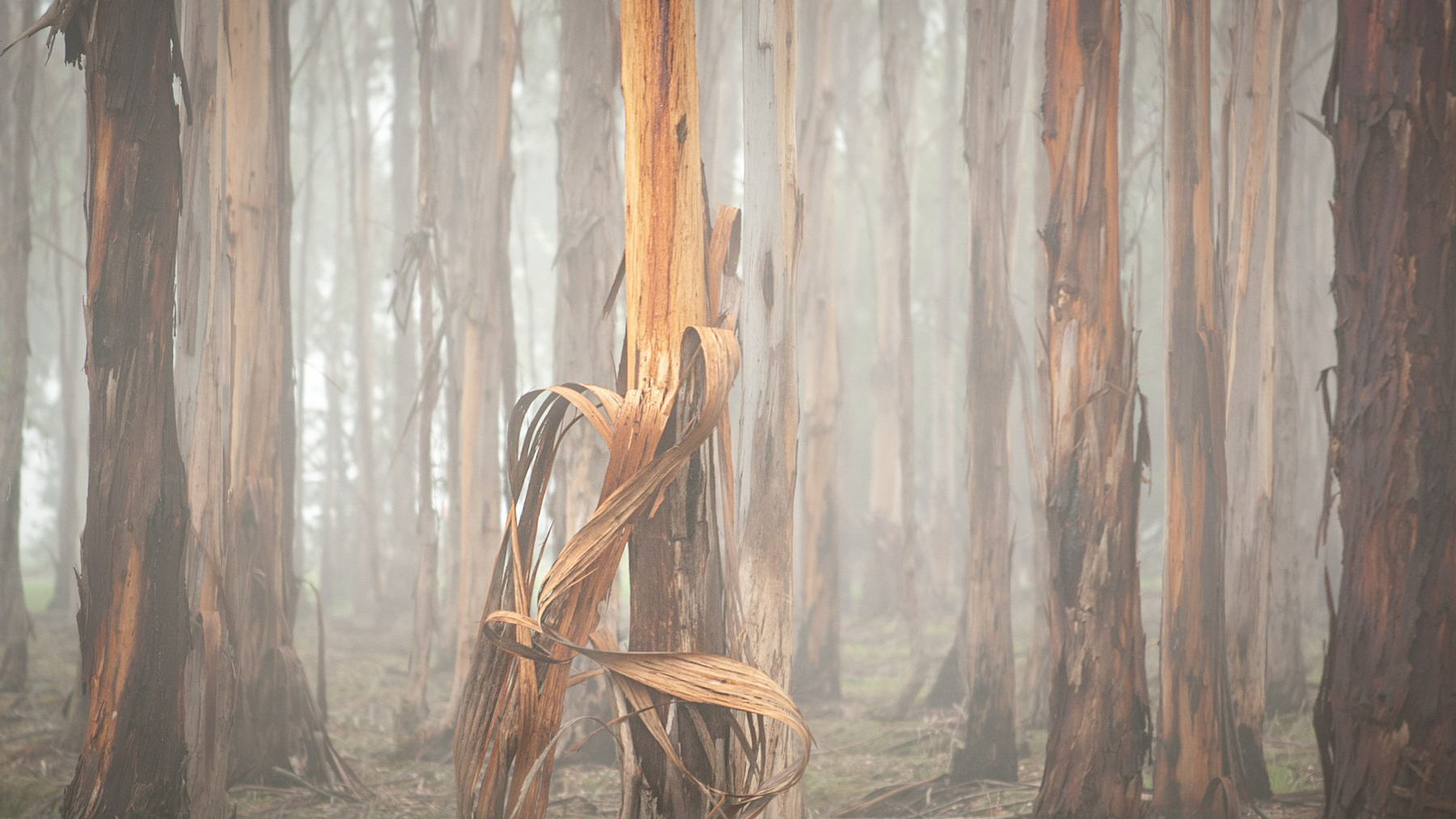
Photo: Ian Ferguson
Rowena is a prolific contributor to social media, as are many on the beach around her. With the posting and the tweeting comes at least three consequences; firstly, there is a global invasion of interest in the unfolding disaster impacting this coastal community cut off by road, but blown wide open online: secondly, if you don’t post for an hour or four because someone else has your phone people think you have died and they don’t forgive you easily, and thirdly, the whisper of prayer emanating from the epicentre of the chaos is magnified and becomes a cry from the hearts and on the lips of millions across the world. All faiths and none. All languages and silence. Praying to the God of many names.
Birds are absent and the islands are burning. By late afternoon it’s safe to leave the beach and return home, whatever that demands. Rowena and the children drive along the intact row of shops, crazy, as if nothing has happened. Rounding the bend, the devastation unfolds. One house burnt to the ground, the next one standing, three down, two up, one down, no rhyme or reason. They arrive home to a singed but safe house, light candles and drink juice from the warming fridge. Sleep comes easy. It’s a new year.
Back on the boat, they’re trying to work out whether to go back or stay. They wait out New Year’s Eve, tired, cranky and hungry for anything but fruitcake. At 7am, they decide to see what awaits them, certain that home will be gone. Coming back, the air is still and smoky, like a gentle morning fog with no breeze. Mallacoota harbour is bathed in an acrid burnt-everything smell. They go to the church first. People are OK, the church is OK, and the SU teams are doing well.
Home is still standing, beyond belief. The neighbour’s house on one side has melted around the windows but, miraculously, the gas tanks nearby are intact. The house on the other side has a sweeping rooftop sprinkler, encompassing the manse roof as well, but not the shed. The radius of the circle doesn’t reach that far. Incinerated tools, bikes, kayaks, projects and church furniture lie beneath the tangle of tin.
Andy goes to his workplace to check on things. Jude walks a little further up the road, sees the burnt bush and houses, sits on the footpath and cries. People are cruising around already, tourists, taking in the toll. Someone pulls up next to Jude and offers a hug. She politely refuses, preferring to be alone. When the weeping wanes, she dusts herself off and goes back home thinking, “well, I’d better get on with work”.
She changes clothes, finds something to eat, and puts on her church name tag, VCCEM lanyard and Police Chaplain lanyard. She’ll wear them all for the next couple of months.
A parishioner has been told by a number of people that her house is gone. She’s in Canberra having evacuated the day before and is worried sick about her cat. Jude goes, finds the house is still there, sends a photo with the cat looking hungry but happy, sits on the kitchen floor and cries.
Jude chooses Captain Stevenson’s Point for the church service on Sunday, 5 January. It’s one of the few places on the beach where the view hasn’t been charred and changed. She’s planned the service with a lady from the Catholic Church and it’s just so hard, in the midst of all this, to make a simple poster.
Usually, she’s pedantic about posters that advertise church events. Funky design, eye catching and inviting. This time it’s hand-written and she’s struggling to find somewhere with power connected to make copies. She stumbles into the doctor’s rooms. They copy them off for her and she sits in a chair and cries. Andy is busy with Fisheries as they have been part of the distribution network moving freight from the airport into and around the town.
Most of the church folk have gone and some have lost houses. The Op Shop goes into overdrive, way beyond capacity trying to cope with needs and donations. Visitors volunteer and the days roll on. The church is open for movies most nights as people don’t have power. On Saturday, the sky turns black as the town is threatened by increased fire activity. This time people seek refuge quickly, filling the church and the Main Hall in town, supporting each other.
On Sunday, about 35 people pray together on the beach – locals, close and loosely connected, tourists and some visitors who’ve been sleeping in the church. Psalm 13 holds lament, confusion and joy. They’re not finished with lament, but the psalm reminds them it’s part of the process and will not last forever.
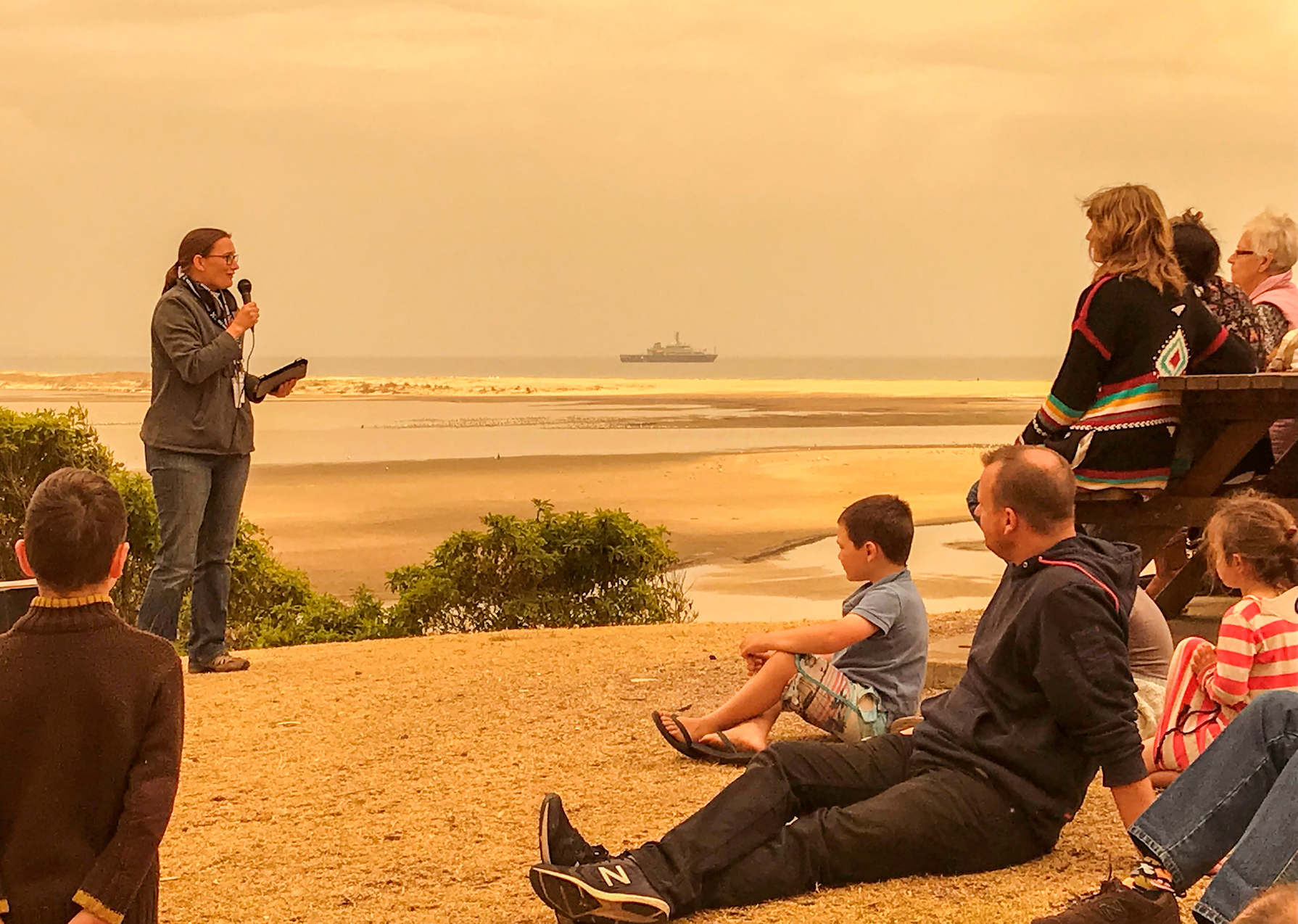
Rev Jude Benton conducting service at Captain Stevenson’s Point, 5 January. Photo: Rev Chris Multherin
Psalm 13 New Revised Standard Version
How long, O Lord? Will you forget me forever?
How long will you hide your face from me?
How long must I bear pain in my soul,
and have sorrow in my heart all day long?
How long shall my enemy be exalted over me?
Consider and answer me, O Lord my God!
Give light to my eyes, or I will sleep the sleep of death,
and my enemy will say, “I have prevailed”;
my foes will rejoice because I am shaken.
But I trusted in your steadfast love;
my heart shall rejoice in your salvation.
I will sing to the Lord,
because he has dealt bountifully with me
Jude reads My Many Coloured Days, by Dr Seuss. “Some days are yellow, some days are blue, on different days, I’m different too.”
The RAAF is flying overhead, buses are moving behind them, full of people leaving to go north while they still can. The service ends with unaccompanied singing of Amazing Grace … blessed are you.
Days run into weeks as Jude stretches time between pastorally caring for her flock as they trickle back to whatever home is now, offering a calm voice in the community, greeting and handling visiting chaplains, being present to the impressively organised chaos at the Op Shop and dealing with calls and emails from people wanting to help.
Sometimes she forgets to eat. For 17 days they have no power at home, cooking over a gas ring and showering in the caravan park. “Sometimes all of the activity seems too much – and sometimes there is that calm assurance that I am not facing this alone, that in the midst of crisis the Spirit of Jesus is here, weeping with those who weep, strengthening me for the next step, and showing me where to stop and rest,” Jude says.
She’s asked to conduct a funeral for a home. Preparing the liturgy gives her precious space to sit and reflect and she feels strongly this is something the church can offer as a ritual for healing to the community, where more than 100 homes have been lost.
Here’s the opening:
Welcome & Introduction to service.
“As Jesus approached Jerusalem and saw the city, he wept over it, saying
‘Now peace is hidden from you’.” Luke 19:41
Introduction of the home, and those who’ve lived here.
Prayer:
“God of hearth and home, maker of love and laughter,
this ground has held a special place
for reflection and restoration, rest and renewal,
A place where (names) found their strength, shared meals,
lived, laughed, loved and entertained friends.
Now this home has been destroyed,
and so we ask for strength and comfort for (names)
as we acknowledge this tragedy with them.
As they grieve the loss of their place of safety and belonging,
may they have courage to begin again. Amen.”
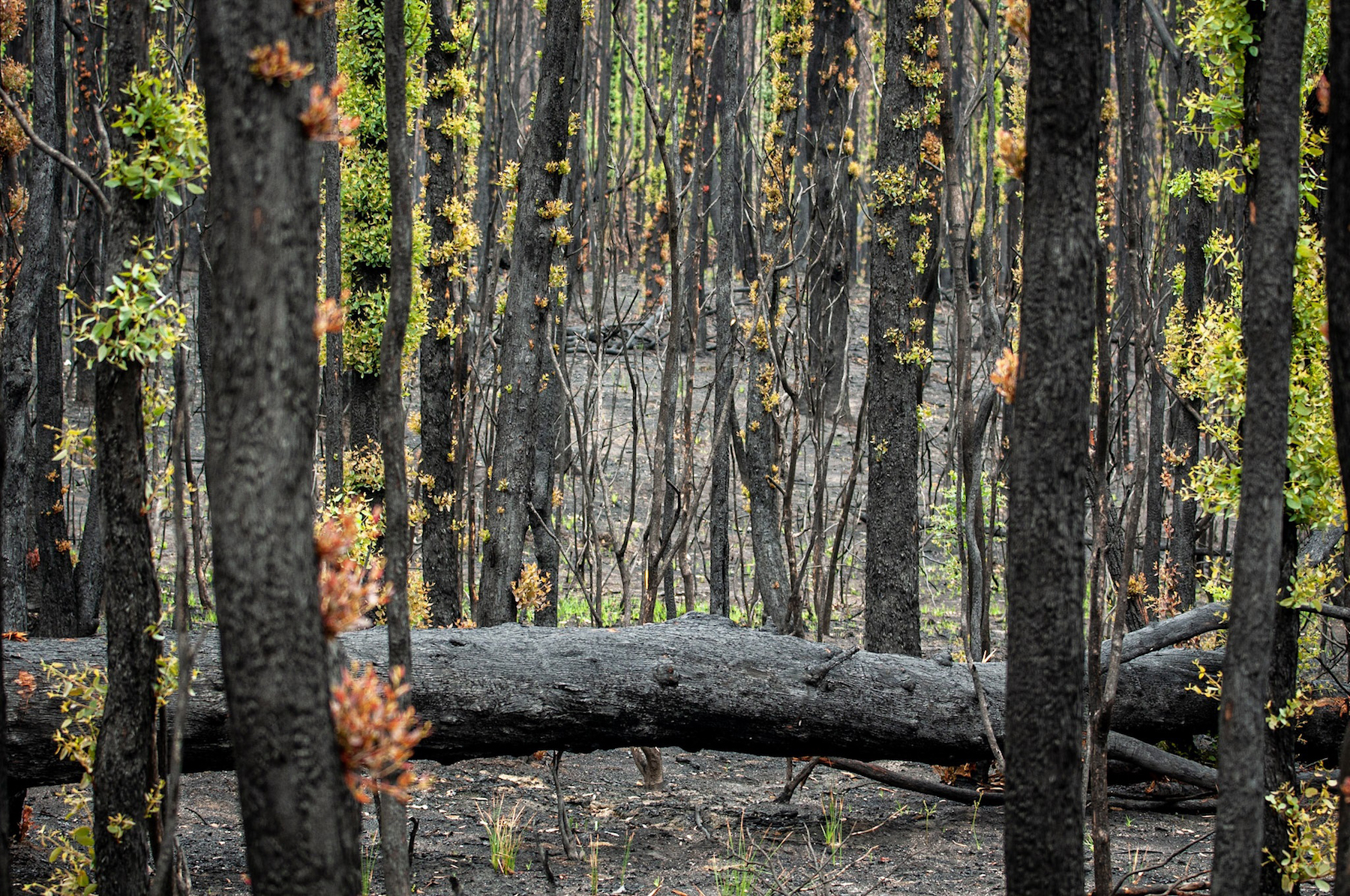
Photo: Ian Ferguson
Rabbi David, chaplain with the Army, offers Jude a seat on the Bushmaster Protected Mobility Vehicle that’s heading to Cann River. It’s an adventure and a relief to be respected as one of the professionals and part of the team. Locals can be so easily overlooked when an exuberance of outside helpers descends.
Jude’s place in the community has been galvanised through her gentle, constant, honest and open response to this disaster. She’s written two articles for the weekly Mallacoota Mouth, one for a NZ Baptist magazine and her own church council report. After a few week’s leave with Andy, she’s looking forward to the ministry that will flow from this time. “We’ve had a voice and a presence, and we’ve done our best,” she says.
Lakes Entrance
Never aspiring to be in this position, captain of the Lakes Entrance Country Fire Authority and Uniting Church member, Phil Loukes, says you do what you have to, because that’s what needs to be done.
Phil’s putting faith into action and explains that God’s grace comes in so many everyday things, especially when disaster breaks us open and makes us vulnerable to each other. We can experience so much goodness: deep and open conversations, outrageous kindness, gratitude and compassion in the most unlikely places. It also allows us to stand up to what’s harmful and have the power to challenge and change things.
When he was young, Phil thought he had to work hard to prove he was acceptable to God. Now he knows he’s loved, regardless, and he just needs to be the shepherd, looking after the people in his midst, whoever they are. Caring, managing, leading, loving and wrapping his arms around them in the pain. That’s why God has put him here.
Phil’s lived in Lakes Entrance all his life and been involved in a multitude of community organisations, having joined the CFA as a junior member in 1971. Co-owning and working in one of the oldest family businesses in the area, he maintains the commercial TV and radio infrastructure in East Gippsland, employs a number of locals and provides specialist technicians to schools and communities from Dinner Plain to Buchan, Gelantipy to Marlo and everywhere in between.
December 30, 2019, is indelibly imprinted in his mind. His son Aaron is on the Bairnsdale side of Sarsfield leading a strike team and Phil and his team are on the other side towards Bruthen. Many of his crew have not experienced the kind of fire behaviour that’s happening around Sarsfield. It’s hot, fast, loud, erratic and unpredictable.
At 3am they’re fatigued and he gathers the team together. Warning them they have witnessed a fire in their home patch that has destroyed houses, businesses, wildlife and maybe even human life, he sends them back to the station. They will all know people who have been impacted. The cost will be huge.
Packing up to leave, Phil is approached by one of his crew who asks to be taken to his home. It’s right in the fire zone and his business is also there. About 4am they make their way as safely as possible to his property, knowing there is little hope. While he’s been away fighting this monster of a fire, Phil has lost two houses, all his flower-growing equipment, all sheds except one and all the plants in his fields and hothouses. His CFA mates feel raw and helpless and all they can do is arrange safe transport to Sale where he will break the devastating news to his wife.
Phil isn’t the only CFA member to be in this situation on this night. In the midst of all this loss and pain, Phil’s concerned for his daughter. She’s gone with a CFA team about the Buchan area that’s been heavily impacted, and communication is down. He won’t hear that she’s safe for another 12 hours or more.
On 3 January, before the next “spike day” when the weather will turn nasty for fire activity again, Phil consults with the Incident Control Centre and gathers all the local emergency services and representatives from key medical and indigenous groups. The decision is made to evacuate the area. There’s a huge weight in having to deliver this message to thousands of holiday makers and locals, but Phil is motivated and strengthened by more than his CFA experience. After Black Saturday, he had to break the news to his wife, parents-in-law and family that their brother and son had perished in the fire. Nobody should have to bear the pain of that loss.
The community meeting is packed, and the message is heard and heeded. By lunchtime the next day, the population of Lakes Entrance has decreased from an estimated 45,000 people to just 2000. They’re safe, but the economic cost is massive. The effect of this evacuation will be long-lasting. Shops will close, some sooner than others. The food and clothing stores that have borrowed on their overdrafts to stock up for summer are in dire trouble. The pubs and cafes can’t pay wages and are throwing out food. The holiday rentals are cancelled, and cleaners are without work. Phil’s business won’t be able to access schools for up to seven weeks, so his work and income stops. Many businesses will not survive the next few months, especially the smaller ones.
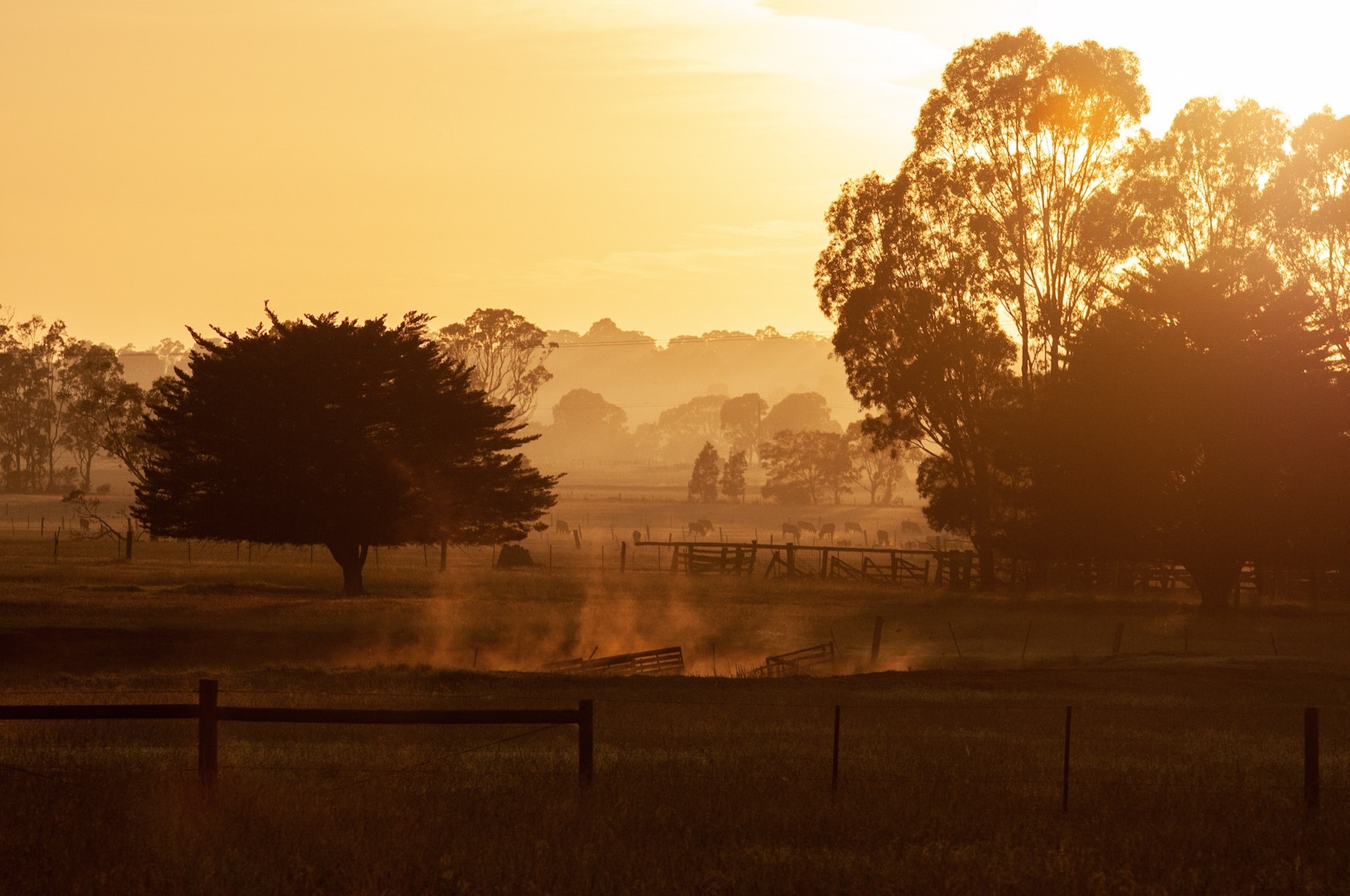
Photo: Ian Ferguson
While acting as a sector commander on the ground and supporting a couple of strike teams in the Murrindal grasslands, Phil makes a trip out beyond W Tree to Gelantipy. The captain of the Gelantipy CFA belongs to a farming family and they’ve been hit hard. He’s lost more than 50km of fencing that’s worth more than half a million dollars. On top of three years of drought and poor income, it’s hard to find the energy or the hours to get going again.
Like many other brigades, the Lakes Entrance CFA has been busy since early November, when they deployed several members to NSW. Support from other brigades is invaluable, but there’s nothing that works better than local knowledge.
Phil’s teams are physically tired due to the long hours and extra work, emotionally exhausted from providing support and carrying the stories of loss, and mentally fatigued from constant critical decision-making.
Phil tells the following story then concludes, “Marian and I know people who have lost everything. One of the stories I can tell is of a retired minister who contacted me asking if there was a person we could identify that needed financial help. They said they would send a cheque, so before it arrived I met with the lady and told her of the generosity of the gift that was being sent. She said ‘others are worse off than us’.
“It gave me the chance to say to her that by being gracious in receiving the gift she was also receiving the love of others who felt it was all they could do to help. Receiving and accepting this gift was being open to being loved by others, we are all worthy.
“Lots of tears and more conversation followed. They received a cheque for $1000 through love and grace. Just one example of so many others. In spite of this feeling of general fatigue and exhaustion, the sense of camaraderie and community support has been overwhelming, and we are better off for it.”
Lake Tyers
Less than 15 minutes from Lakes Entrance is the Gippsland Presbytery’s Camping and Caravan Park at Lake Tyers. Set right on the foreshore opposite the hotel and general store, it’s always full over summer. Ron Gowland, Chair of the Presbytery, oversees the management committee. Ron, Judy and their young children spent their summers here, now his grandchildren join them as well. Like the Gowlands, many families have been holidaying here for more than 40 years.
Usually, in the peak of the summer season, tents, caravans and cabins host a throng of 400 people. Not this year. It’s 30 December and the 300 or so people in the park are deciding if they will stay.
Some families set up in their usual spots despite the early recommendation to leave East Gippsland. The evening skies glow red and it’s eerily quiet. Managers Miranda and Terry Fulford say that if the park was empty, they wouldn’t have stayed, but they’re responsible for the people on the property, so they stay. They’ve briefed some young men on the use of fire hoses and nominated the brick assembly hall as a refuge if required.
Only a few days later the evacuation call comes through and they close the facility. Miranda and Terry go to Stratford to wait it out. Ron takes his family home. The fire front comes within 7km of the park. Roads reopen in a few days, and they reopen the park only to be evacuated once more because of the hazardous air quality. Many won’t return until next year. They will lose $70,000 income. People are safe, that’s what matters.
Corryong
North East Presbytery is battling the blazes too, the Corryong Complex fires, made more complex by the state borders the fire doesn’t seem to acknowledge.
Rev Andrew Delbridge is the Alpine Regional Resource Minister and an Army Chaplain. He’s had experience in the clean-up after the Black Saturday fires of 2009 and the same principles apply here. People, lots of people, are running around full of busyness, often getting in each other’s way. It’s smashing the farmers hard.
Drought, fire then flood washing away what was left of rocks and soil. They’re losing generations of breeding stock and if they had to choose, most would rather lose their houses. There’s a long road to recovery, if they take that path. Others will walk off the land, as they have already. No need to lock the door. Don’t look back.
It’s the tyranny of distance that makes this harder for Andrew. He’d rather drive an hour or two and have a face-to-face conversation with someone who’s hurting than make a phone call.
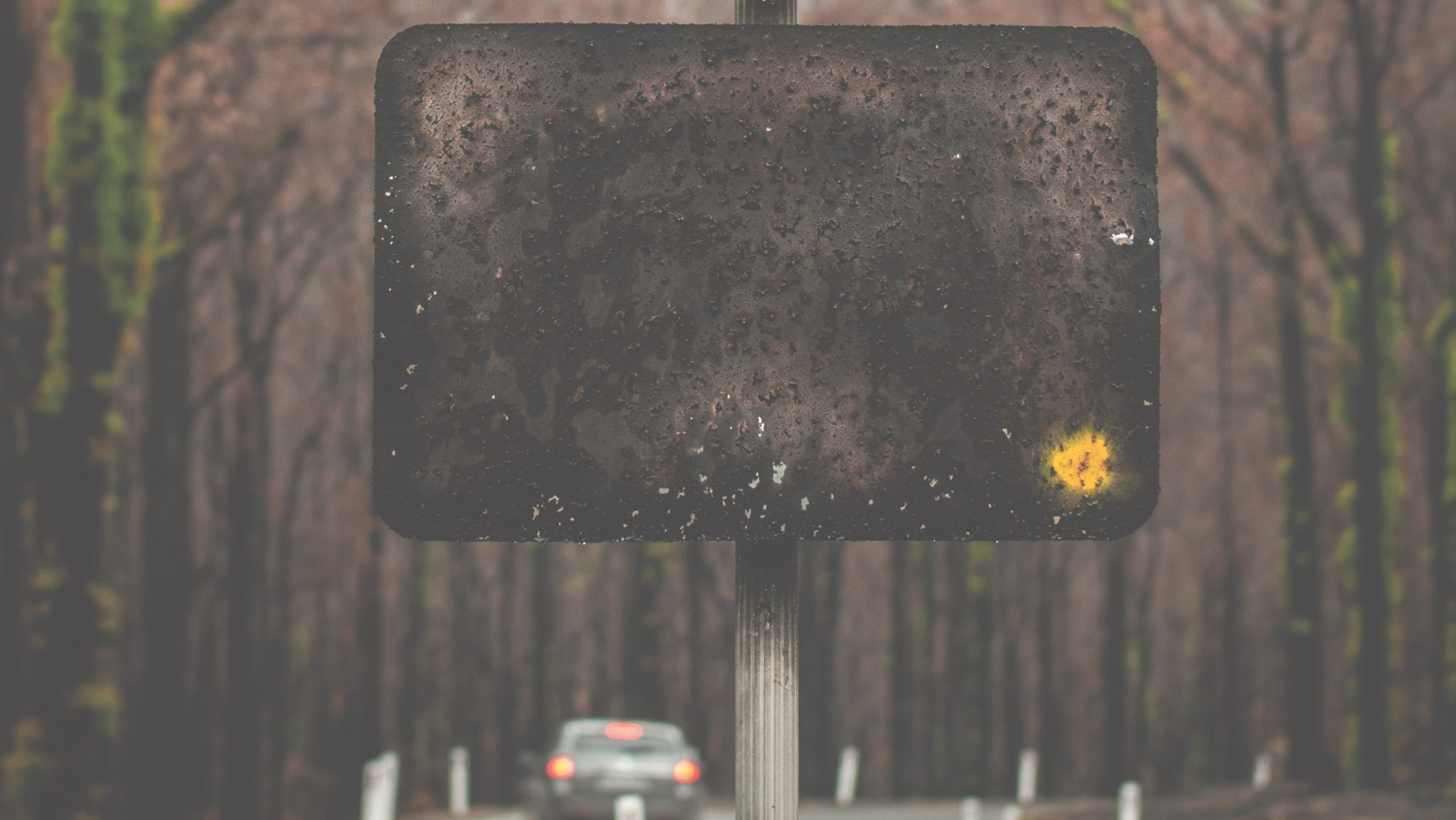
Great Alpine Road, near Bruthen, 14 Feb. Photo: Ian Ferguson
Blaze Aid, the volunteer organisation that comes in quick and mends essential fences on farms, rings him and he arranges a catch-up with a battling man on the land. There’s a local footy match happening somewhere else and they’d like the chaplain to be there. It’s only an hour and a half in the other direction, he can make it easy.
He can’t be everywhere for everyone, however, and that’s one of the costs in a disaster. The usual rounds of ministry are disrupted, and Andrew isn’t there when one of his congregation members breaks down in the worship service and needs comfort and care. The congregation gather round her and Andrew follows up when he can.
The impact and cost of these fires moves way beyond the burning landscape. Andrew gives me two names of church folk in Corryong to contact: Pamela Menere and Linda Nankervis.
Pamela’s voice has the heavy tones of a weary soul, but she’s happy to talk. Her family came to the Corryong district in the 1860s. They farmed successfully, raising a dairy herd and establishing the first flour mill in the area until the 1939 fires destroyed the family farm and sent them into town, where Pamela lives now.
In normal times she doesn’t shop, feeding herself from the extensive vegetable garden, but these are not normal times. She spent 48 hours putting out embers around the house at the peak of the inferno. The fire came at the town from two different directions, two days apart. She left town on the last convoy on 5 January, driving through burning roadsides, and was away for two weeks. Some of her friends haven’t come back. Their stone house has burnt to the ground, the roof resting on what used to be the floor, the stone walls standing sentry to nothing and no one.
The church hall was used as a wildlife rescue station and the manse housed Red Cross volunteers and VCCEM chaplains sent in for a week at a time. The Uniting Fencing team from Benalla camped in the carpark. Pamela made sure they had what they needed. She’s the person other people contact when there’s a need that can’t be met through the official systems. She has a list of people waiting for replacement water pumps to bring water to the stock from rivers and dams. They’ve sold out in Albury and are waiting for a truckload from Melbourne. There are a shortage of rental houses and those who were burnt out are struggling find somewhere to live.
Pamela coordinates help and does her best to make sure people get what they need, whatever that might be. Since the fires there have been floods, mud and rockslides and whole sides of mountains slipping down on to houses and into burnt out valleys.
There’s a pause in conversation.
“On Sunday night,” Pamela begins and the heaviness in her voice expands, “my 18-year-old nephew took his own life. He told his mother he was going fishing and didn’t return.
He was a gentle caring soul who had been rescuing animals all his life. His friends lost their houses and livestock, he experienced the fury of the fires first-hand.
“The trauma of seeing all of the devastation was too much. He’d sought help and was on anti-depressants, but it wasn’t enough. He just ran out of hope. He’d graduated from his VCE and had been accepted for an apprenticeship. He’d done his training with the CFA summer fire crew only two weeks before the fires started and had been out fighting fires in the disaster. His death will never be counted in the fire statistics, but it should be.”
The town is devastated. There are mental health bulletins going out. I ask if she wants me to share this story and she says it’s important. Her prayer is that the community recovers without any more loss of life. She sees the emotional trauma on the faces of people in the street. The impact of the fires is beyond imagining.
There are a lot of people asking Pamela why God might have done this. She tells them God didn’t do this, and that God is in the recovery, in the new growth and reviving of nature. God is everywhere, giving us life. Her faith is her resilience. She’s been caring for a friend with cancer and has just come home from gathering firewood for the winter, there’s still plenty around.
Linda Nankervis is a farmer on 1000 hectares. That sounds a lot, she says, but it’s steep, rising country. Soft, undulating, with lots of hills. I catch up with her on the phone while she’s visiting grandchildren in Geelong. They haven’t seen her since the fires, so I try not to intrude too long.
The fire came through twice, days apart. The first time was New Year’s Eve and it stopped at the edge of the property. The second time it ran right through them. All up, they lost 39 head of cattle, out of a herd of 880 and paddocks, and feed, and fences …
They were able to save most of the stock because they had the time and facilities to move them to safer ground. It’s an horrific undertaking to bury your animals. Luckily, they had an old excavator. It’s like any death, you do what has to be done. The boys took care of theirs one day and their neighbour’s the next.
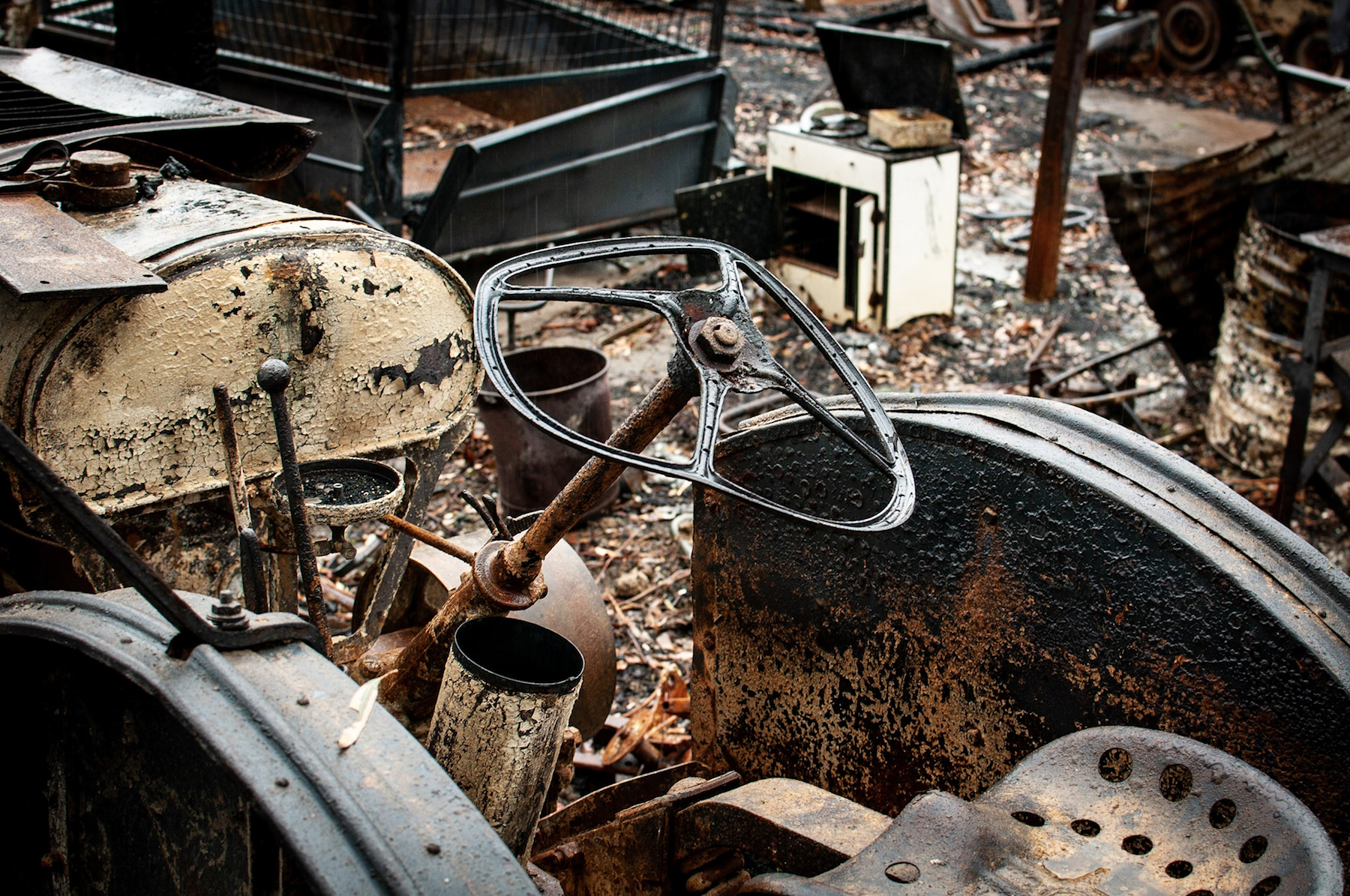
Farm shed, Sarsfield, 4 March. Photo: Ian Ferguson
Linda continues, “The frightening thing isn’t the fire, it’s the waiting. Once it comes, it’s a relief. Our house was spared, but we slept in town for a week after the fire. Out at the farm it was constantly dark, black with smoke, like 5pm on a winter’s night and hot. Then there’s the acrid smell of ashes. It took us ages to get the cattle into two mobs, into paddocks. They cry with distress. For them, it’s like suddenly ending up in a refugee camp; you’ve undergone a huge trauma, you’re not on your patch and you don’t know where your mob is and there’s no food and a great queue for water.
“My brother-in-law, whose place was burnt four days before us, crossed the paddocks in a truck 24 hours after the fire to bring us a load of hay. The power lines were down over the road. They settled after they’d had a feed. The trauma counsellor encouraged us to get back to routines as much as possible, so we cleaned the black soot out of the house and that was helpful.
“Rev Andrew Delbridge showed up early in the week after the fires. There was hardly any phone reception and I was frantically trying to secure feed for the stock. I had to keep going out to the verandah to get reception. I was constantly walking dirty footprints into the house and the mess was really distressing. Andrew asked what he could do to help so I gave him a mop to clean the verandah. When I think of it now, I’m horrified, but he was happy to help.”
Linda talks about the Sunday, two weeks in, when they gathered in the Corryong Uniting Church hall for prayers. They just showed up and people kept coming in. Andrew came and the ADF chaplain popped in. I ask Linda what it means to be a person of faith in this disaster, “Faith is about struggling with all the difficulty, all the time, not about escaping from it. It’s mucky and murky and you never know what you’re going to get.”
Melbourne
Back in the city, it’s horrifying. There’s an unfathomable scope to this unfolding disaster that hasn’t been encountered before and it’s happening in places the city folk know and love. Holiday spots, returning summer after summer, camping, fishing, boating, recovering from the stresses of life in these idyllic locations that are now on fire.
There’s a terrible sense of powerlessness. What can we do? What do we have to offer? The donations of money, food, clothing, time and whatever else comes to mind pour into the ravaged communities.
When Rev Ian Ferguson gets the call from the Synod office to consider a three-month secondment from his placement in Brunswick to the empty manse at Bairnsdale his first response is relief. Here’s something I can do. Here’s a way to contribute that’s part of who I am.
He’s on the beach, on holidays away from the fire zone and he thinks about Jesus calling the fisherman to follow. They were called to use their skills in a different way. “I will make you fishers of people.” They were called to do what they already do, in a different context. Brunswick UCA and Ian’s family bless the plan. Bairnsdale UCA makes the manse comfortable for everyday living from the Op Shop store and Ian’s in place ready to work with the congregation and the presbytery, offering care and support to local ministers and communities.
It’s that “need to do something” that fuels the work of the VCCEM, which is part of the Recovery and Relief Plan of Emergency Management Victoria. To join as a volunteer, you need to be a recognised member of your faith community and do the training. Just because you can, doesn’t mean you should. Social media was flaming when a volunteer from another agency caused great distress to an Aboriginal elder, his people and the community.
It’s a hot and blustery day and the wind is whipping up fires and playing havoc with evacuee’s tents on the oval at the Relief Centre.
There’s a heightened sense of danger and distress. I’ve been out helping a colleague re-pitch the flattened tents, being quizzed by him on bible verses until I needed a break. Did you know that Abraham was called a tent peg? Sitting inside with a glass of water, a man beside me comments softly in my direction, “I think I’ve done the wrong thing today”. The story unfolds about hours of giving out petrol vouchers and inadvertently insulting the elder who came later in the afternoon as the value of the voucher offered was greatly reduced from that given to others in his family earlier in the day.
Underneath the story I hear a deeper one of lack of cultural awareness and training, lack of cultural safety around these vulnerable people seeking assistance – lack of character, someone said.
Volunteers can spend hours doing good and undo it all in one single action and the damage is often irreparable. Racism runs deep and can take so many forms. Unless we know ourselves well enough to understand how we respond under stress, how our actions impact those around us, how our desire to help can sometimes do great harm, we shouldn’t be out there where it matters.
Every conversation we have is sacred. Every person encountered, agency and evacuee alike deserve our pastoral best. I sat with him and heard his story and went away with a deep sadness.
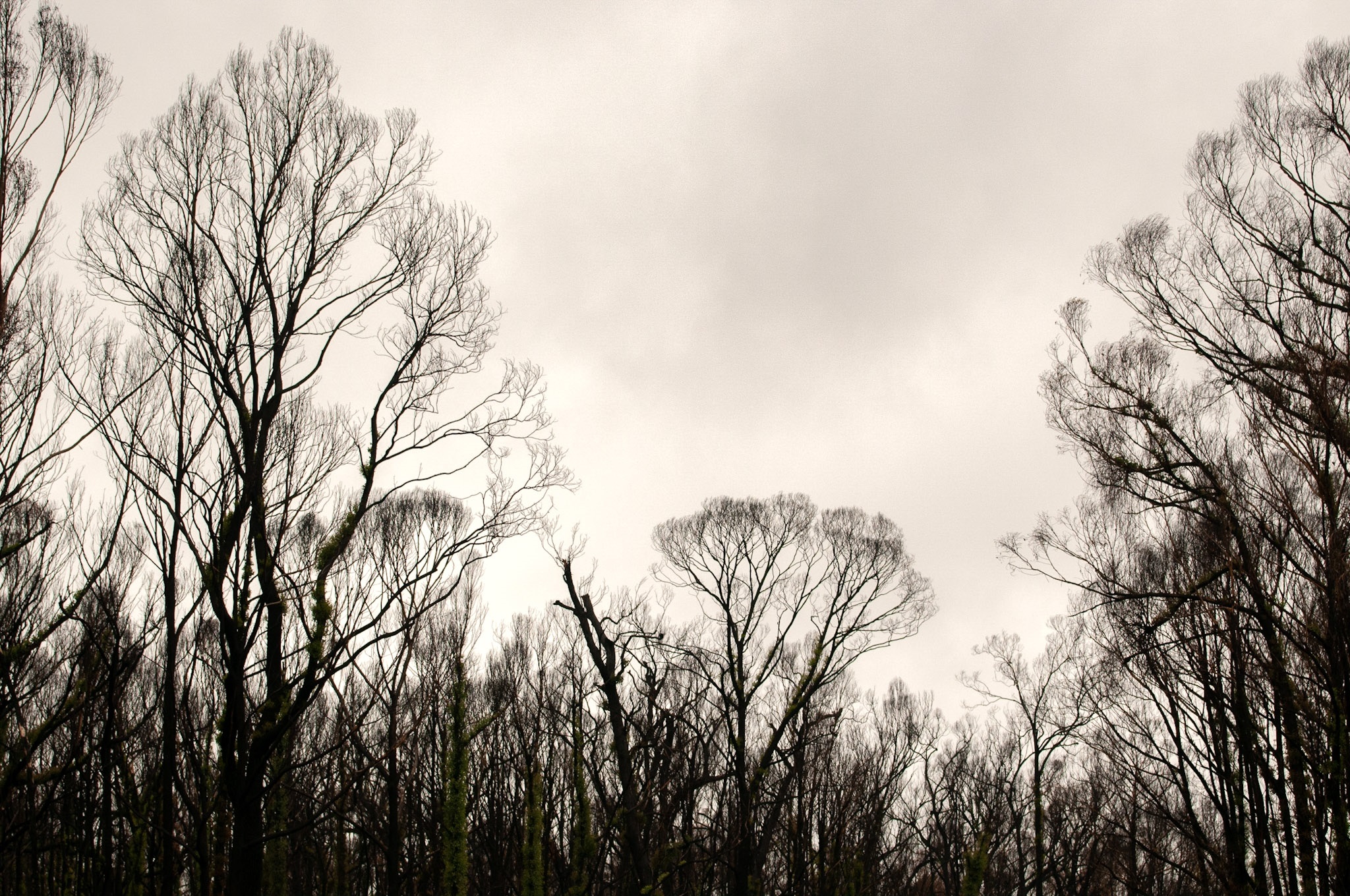
Photo: Ian Ferguson
Mallacoota, four weeks on
The biggest curly blindside for VCCEM was when we were asked to airlift teams into Mallacoota with the RAAF. There’s a massive vote of confidence in what we do right there. Imagine this; as a volunteer you’re asked to consider being deployed for five days into a dangerous area that’s cut off. You’ll need a day either side for travel and you’ll probably not know your teammates. You’ll stay together in a stranger’s house where the fire has burnt almost up to the back door but it’s safe except for a hole on the verandah floor, please avoid. Oh, and by the way, you’ll be flying in on a military plane.
Mallacoota’s airport runway is 1000m long. A RAAF C-27J Spartan requires 680m to land, so it pulls up short and fast, hold on. I’m given that intel mid-flight by my cousin’s husband, a flying geek. As far as I know that’s accurate. We sit on stretcher seats lining the body of the plane and, as we touch down, I end up in the lap of the person beside me, strangers no more.
We’re the third VCCEM team to be sent in this way, for five days’ deployment. It’s 27 January and Team Charlie is on the ground.
Dropped off at Rowena’s friend’s house on the outskirts of town and surrounded by burnt bush, I’m just beginning to take in how ferocious this fire has been. Rowena was airlifted out in a Chinook by the RAAF, after 10 days of waiting. Her Frontier Services Car is safe, parked near the buckled fences and spared paddocks just beyond the house. The family have evacuated too, driving out when they could for a break somewhere less stressful and sad.
Crushed water bottles and breathing masks line the car and it smells like my Grandpa, stale smoke. I drive into town to join the rest of the team at our accommodation. Someone from the church has left the keys, in case the house can be used, and it is, with gratitude, by the first two VCCEM teams and now Team Charlie makes it home base.
The town should be bustling with holidaymakers, instead it’s full of service and agency people like us. The Army, RAAF, CFA, SES, DHHS, DELWP, Parks Vic, Red Cross, Vinnies, Salvos, Wildlife Vic, Zoos, Fisheries, Vic Pol & their Public Response Unit … and VCCEM.
They call us “The Chaplains”. In many ways I feel as if we are a uniformed invading force, in a town under siege, and that’s not entirely comfortable.
The local pub is closed to the locals, feeding the workforce with hundreds of dinners daily. Cafes have an arrangement with DHHS to pay for our lunches, or we can get them from the cool room at the CFA, bagged and ready.
The morning of day two I discover there’s a DHHS-sponsored coffee hour from 0700hr to 0800hr at the hut down by the water. It’s a gathering place for morning briefings for the services and there’s some good opportunities for pastoral conversation with a variety of service and agency people as well as the tired and tested locals.
The barista’s an artist, each cup a different design, delicious and worth the wait. I deliver him a set of keys to a holiday house, from a family in the Mirboo North congregation who were evacuated by boat. A friend of the barista has lost his house and he’s couch surfing. This will ease things in the short term.
Community meetings are held every few days, updates and questions time with a small packet of chocolates on each seat. As we arrive for the meeting at the Relief Centre there’s talk about it winding up and moving into recovery mode. It was set up and tirelessly maintained by good-hearted, capable locals when nobody else could get access to the town and there’s some tension around whose decision it is to close and what should happen to the boxes upon boxes of food donations.
There’s a sign on the door in capital letters that says WELCOME TO THE PEOPLE’S REPUBLIC OF MALLACOOTA. It’s a sign. Dr Rob Gordon, a psychologist specialising in bushfire recovery, has made himself available and his presence is respected.
There’s a calm quiet when he speaks. His message is recovery takes time, shouldn’t be hurried and that individuals and communities who recover well have good social capital; connections and care for each other and a commonality of purpose. He tells the gathering to be kind to each other. He tells the local government and agency staff to commit to following up quickly on questions and comments that arise. He tells individuals to get as much as they can of pleasure and leisure and to look out for their neighbours.
In the dusky light of a smoky evening, out at Genoa’s first community meeting since the fires, after a sausage in bread with sauce, the community gathers in the hall. You can sense the collective strength in these people even though they are so weary. I speak to a young couple who have been living here for two years. They’ve been told that now they are locals; they’ve lived through the inferno together, bonded by tragedy. Alongside the devastation to bush and wildlife, there was a loss of human life in this community and the pain is palpable. Two of our VCCEM chaplains have been invited and we bring bags of chocolates from Mallacoota, one for each seat.
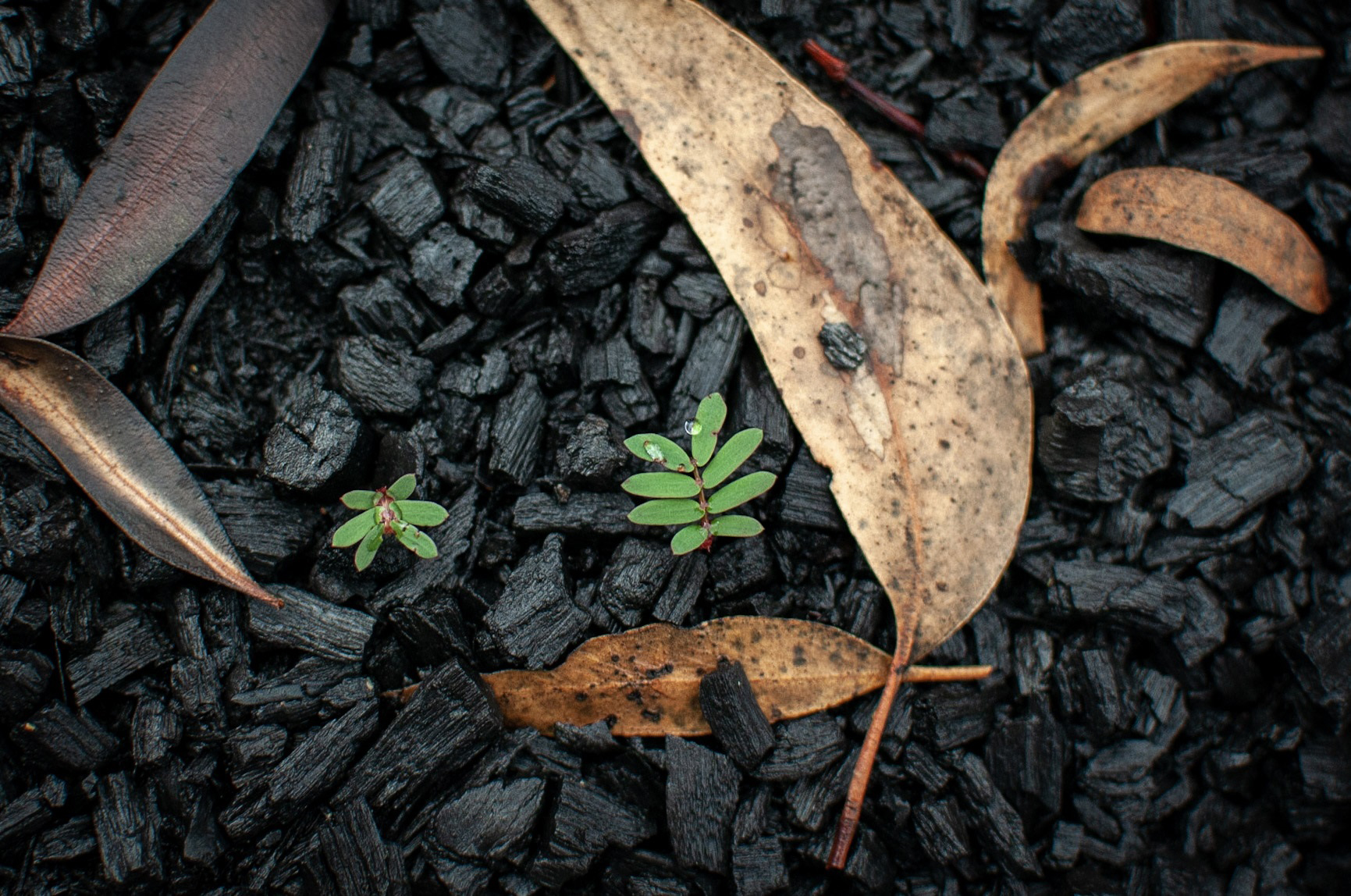
Photo: Ian Ferguson
People are angry with the way the forests have been managed. A local group made recommendations that were ignored. Communication wasn’t great and the tiny community at Gypsy Point continues to live without adequate mobile or internet connection, constantly cut off from warnings and information.
Rob is spreading his message of calmness and kindness again and they listen, leaning into each other, and you can sense them let go a little and breathe. There’s talk of cool burning and learning from indigenous land practices and the conversation is deftly dismissed with hard words from a local that no one wants to challenge. Then it’s supper time and one man makes his way past the cakes and out into the night. Standing at the door I catch the eye of Bruce Pascoe, writer and wise elder. We exchange a silent, powerful something and he leaves. I’m feeling blessed and gutted.
Our deployment includes countless conversations in cafes and around the town, delivering food boxes to a recently returned family and sweeping burnt leaf litter from the front yard of the kindergarten.
We help pack boxes of unclaimed food and stack them in a storeroom. No one knows where they’re going. In a week or two it will flood, and the lower boxes will buckle and break. It’s part of the struggle of managing an abundance of generosity.
School goes back this week and we get a wave from a teacher as we walk a circle of blessing around the perimeter fence on day one. Life is returning to a semblance of recognisable rhythm, at least in some ways.
Heavy smoke at the airport grounds the planes, so, with a permit from the police and permission from VCCEM, I drive the team out of Mallacoota in Rowena’s car, on a day that will hit 40 degrees.
Somehow, I have switched on the heated seat option and I share my strangely personal discomfort with the passengers who laugh and are unable to assist. Finally, after driving through hours of blackened landscape and smoky fog, carefully moving around roadworks and heavy machinery, I drop them at the RAFF base in Sale. Stopping to refuel, I discover the switch and turn it from “high” to “off”. Relief. On my way home.
Gippsland Presbytery’s Ministry Team has been working away. Deb Bye is keeping our social media profile updated with stories from the churches and beyond, while hosting an evacuee, handling insurance arrangements for Jude and Andy’s shed and Rowena’s car, and managing as best she can in the smoky days that deeply impact her health.
She’s also keeping on top of the work required for an ordination in January and a change of Presbytery Chairperson in February.
Rev Peter Batten has had a small relief centre of his own operating from the manse in Sale, where his family and their friends evacuated to, from holidays in Lakes Entrance. He’s also been deployed with VCCEM in the local centre and at Bairnsdale.
My husband, Rev Arnie Wierenga, is the Team Leader for the Pelican Ministry team that covers the churches that have been impacted. He’s been liaising with Synod, Frontier Services, Bishop Richard from the Anglican diocese and numerous other folks, as well as keeping in pastoral contact with our ministers working in the area. He’s pleased to see me arrive home. I’m grateful to be home.
Bairnsdale, six weeks on
Ecumenism has come to the fore. The local minister’s group organised a grief counselling session at the Riviera Christian Church and a service at St Mary’s Catholic Church attended by more than 200 people, followed by a BBQ hosted by Rotary.
There have been other ecumenical services held at Buchan and Bruthen and a concert for fire-affected children, with show-bags made up by Rotary, Red Cross and the Bairnsdale UCA.
Ian Ferguson has been learning about rural ministry. In his first week, he’s planning a trip to Swift’s Creek to visit Rowena and attend a meeting. Rowena suggests it would delightful if he could bring a kilo of prawns for her dinner. Fresh prawns don’t find their way up the mountain easily. So, bless his pastoral heart, he sources them in Bairnsdale and sets off in the rain. Less than halfway up the Great Alpine Road the traffic has come to a halt. Down a severely burnt mountain slope bursts a river of mud, taking trees in its wake and surging across the road. No one is going in either direction. Ian and the prawns beat a retreat. He checks the Vic Roads app next time he’s planning on heading up the mountain.
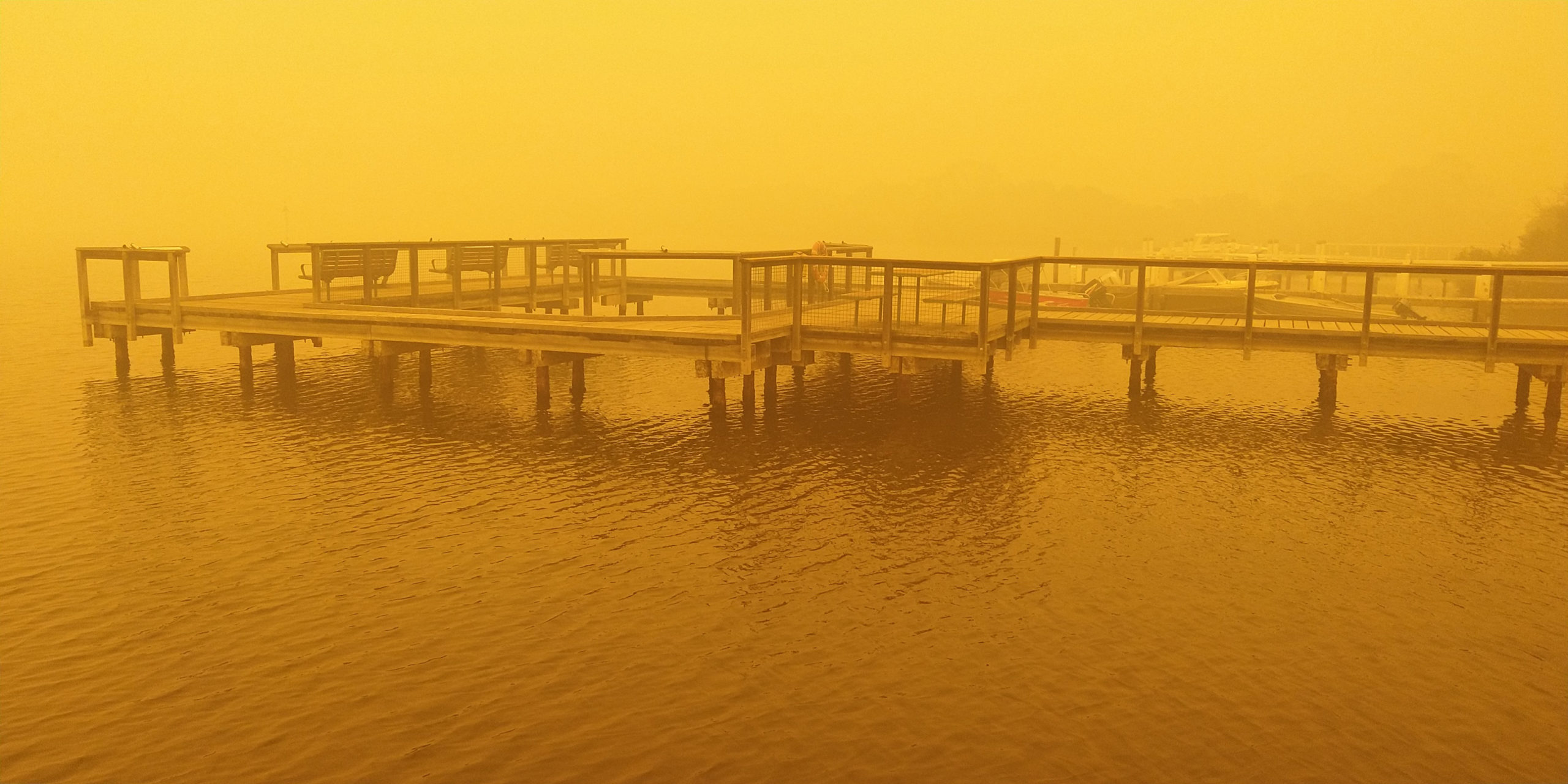
Mallacoota Jetty, 30 December. Photo: Alan McNamara.
Orbost
It’s the third weekend in February and Arnie’s co-leading a Saturday afternoon retreat for the Orbost Elders with Rev Nathaniel Akoi Atem. I’ve walked in as they’re discussing how the First People’s lived in harmony with earth, water and fire and how much we could have learned and still can.
The talk turns around to individual and collective feelings of helplessness and of being overwhelmed by the disaster that unfolded around them. They’re quick to say that as a church they did nothing and have nothing to offer that’s relevant or required. As the conversation continues it seems that’s not the truth. Nathaniel consulted the Church Council and stayed on to offer prayer and pastoral support while his family evacuated to Melbourne, his son pleading to stay to look after his father.
Don belongs to Rotary and they’re rebuilding sheds and fences. Grace is the “God lady” at the Bowls Club and she’s trusted with stories of struggle. Each Sunday as the fires raged around this small, strong congregation they faithfully conducted worship, hosting the Fijian Army Unit and delighting in their gift of song.
Seventy-five people came to “Chat n Chew” in February; more folk than usual wanted to share in the hospitality and community of good food and company. There’s a yearning to open the church doors more often, allowing access for others into their space of healing and hope. Still in the grip of drought despite the visible greening they resonate with resilience. Farming families have long memories. David has to leave the table before the blessing. He’s got a truckload of silage outside to deliver to the dairy before dinner.
What now?
Hold these stories with prayer and care, and the many more that have been shared already and are yet to be told. Donate money with no conditions. Visit, and worship with the local folk. Stay, spend money in the towns and support the small businesses. Plan a church camp at our park at Lake Tyers. Keep us all in prayer. In six months, as winter opens into spring, ask what you can do to help.
If you have skills, gifts and graces in chaplaincy or pastoral care to offer, for a short or longer time, contact the Gippsland or North East Presbyteries.
Prepare a disaster plan for your congregation, agency, school, presbytery or synod. Have a meeting, think of scenarios, buy what you need. Make networks with your local Emergency Services and find out how you might fit in with their plans.
These stories hold the holy, the presence of the risen one amongst us. Our world has been fundamentally changed by this horrendous bushfire season. Now is the time, more than ever before, to take off our shoes, stop stomping over this fragile, ancient earth and tread lightly, live lightly, love greatly. All of us are bushfire affected. This is holy ground.
Blessing
(from the Funeral for a Home)
“The God of compassion,
who grieves with us and with the land,
for all that has been lost,
bless you with love and comfort, now and for ever,
In the name of the creator, sustainer and giver of life. Amen.”
By the numbers
34
Number of people who have died
2779
Number of houses destroyed
5900
Number of buildings destroyed
186,000
Number of square kilometres burnt
500 million
How much money has been donated
1.25 billion
Number of animals that have died

Rev Jennie Gordon. Photo: Rev Arnie Wierenga
Rev Jennie Gordon lives in South Gippsland with husband and ministry partner Rev Arnie Wierenga. Recipient of the national Romanos the Melodist Prize for religious poetry, she co-wrote Dad & Daughter, Prayers and Poems on the Gospel with her father, Rev Ron Gordon.
Need help? Contact Lifeline on 131 114
This story originally appeared in April’s Crosslight magazine. You can read the full magazine here.




